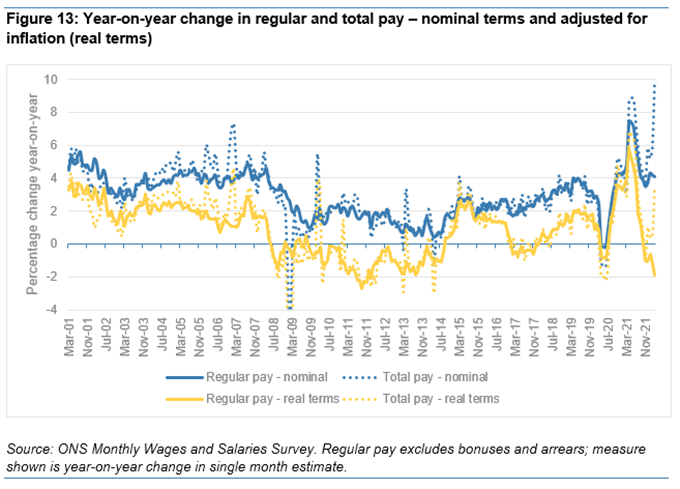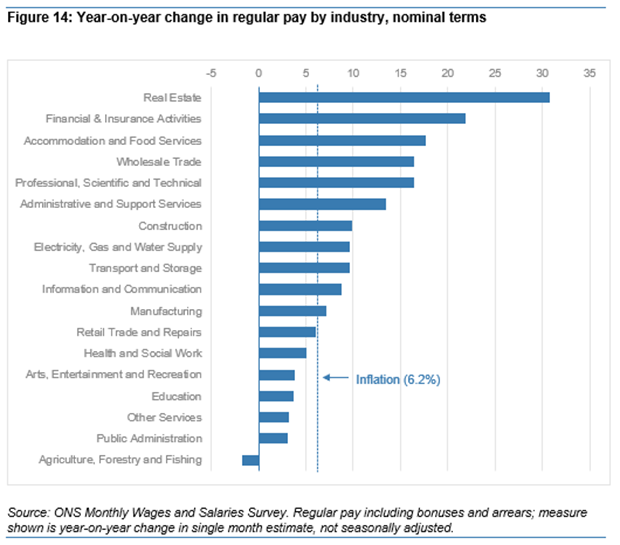For the first time since records began, there are fewer unemployed people than job vacancies, what does this mean for the graduate recruiters?
- The number of job vacancies this year has risen to a new record of over 1.2 million
- Long-term youth unemployment is at its lowest ever, as is overall youth unemployment
- Growth in pay hits highest levels in 20 years
- For the first time, the number of vacancies was larger than the number of people unemployed
- Inflation has hit a 40-year high
- Job-to-job moves has hit a record high
- Redundancies fall below pre-pandemic levels
UK inflation has hit a 40-year high, as cost of food and energy soars. The escalating cost of food and transport is contributing to the rising cost of living, which deeply impacts low and middle income families. What does this inflation have to do with the overall labour market? And how will this impact the graduate labour market?
The latest job figures released by the Office for National Statistics yesterday paint an interesting picture. The employment rate has increased this year, mostly driven by 16 to 64 year olds moving from unemployment to employment. Job-to-job moves also increased to a record high, driven by resignations rather than dismissals.
Let’s look at pay growth. Growth in total pay (dotted blue line) has hit the highest in at least 20 years, this has kept wages above inflation (dotted yellow line). However, the regular pay growth (solid blue line) is weaker, what this means is that private sector bonuses across different sectors are driving this.

Figure 1 shared by Institute of Employment Studies
When we look at the sectors that are paying the most, private sector is racing ahead, yet the Arts & Entertainment sector, Education, Services, Public Sector and Agriculture are all doing poorly and not keeping up with inflation. This means in real terms, workers in these sectors are losing purchasing power.

Figure 2 shared by Institute of Employment Studies
These higher salaries are being fuelled by incredibly high vacancies, the highest vacancies on record, and record low levels of unemployment. This highlights how we are currently in the tightest labour market ever. When we consider the graduate labour market specifically, long-term youth unemployment is at its lowest ever, as is overall youth unemployment.
And despite really strong demand for workers, many disadvantaged workers are missing out on employment opportunities. There is a huge employment rate ‘gap’ for people who are disabled, as well as for older people and ethnic minority groups.
What does this mean for graduate recruiters? With the labour market tightening up and the rising cost of living, candidates will have significantly more choice. This may have knock on consequences such as higher renege rates, as well as the need to consider your total reward package to remain attractive. As higher wages and bonuses boost across private sectors, sectors not increasing their salaries may struggle to recruit graduates.
However, what can your organisation do to recruit more young disabled people, or young people typically excluded from the labour market? Action on job security, flexibility, more inclusive recruitment, and a more supportive workplace may help organisations transition through an incredibly tight labour market by including more young workers in their recruitment efforts.
In other news:
Graduate development and recruitment
The UK will soon launch a new visa to bring talented graduates to Britain. The United Kingdom is on track to introducing yet another visa to attract high potential individuals to the country.
Expected to launch on May 30, the High Potential Individual (HPI) visa is aimed at attracting high-skilled foreign university graduates – who will be allowed to work and stay in the U.K. for two or three years, depending on their degree level.
Graduates owe nearly twice as much as people who did not attend university. Young students and graduates have £12,445-worth of non-student debt, while people who did not attend university typically owe £7,105, Equifax said.
Education
Focus on phonics to teach children how to read ‘is uninformed’, study says. UCL researchers join more than 250 signatories of open letter calling on government to change policy.
While Nadhim Zahawi says Britain should be proud of private education Oxbridge entry must be on merit, education secretary insists, his statements have been met with heavy criticism for being classist, elitist and ignorant.
Queen’s speech set to include crackdown on unregulated schools. Proposals to include threat of jail and unlimited fines for proprietors who ignore safeguarding concerns
More on the Labour market
UK seeks labour market solutions to ease cost-of-living crisis. Britain launched a review into its labour market to find ways to ensure workers benefit from Brexit, “Levelling Up” policies and its net zero ambitions, seeking longer-term solutions to a cost-of-living crisis.
EasyJet is to offer new and existing cabin crew a £1,000 bonus at the end of the summer holiday season, as airlines battle to retain and recruit staff.


0 Comments